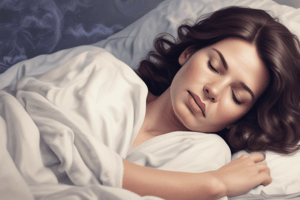Podcast
Questions and Answers
What is the most common type of sleep apnea?
What is the most common type of sleep apnea?
- Mild Sleep Apnea
- Complex Sleep Apnea Syndrome
- Central Sleep Apnea
- Obstructive Sleep Apnea (correct)
Which of the following is a symptom of sleep apnea?
Which of the following is a symptom of sleep apnea?
- Excessive daytime sleepiness (correct)
- Frequent waking during the night for urination
- Nightmares
- Restless leg syndrome
What contributes to the risk of developing sleep apnea?
What contributes to the risk of developing sleep apnea?
- Low blood pressure
- Diet high in carbohydrates
- Regular exercise
- Obesity (correct)
Which diagnosis method is a comprehensive sleep study?
Which diagnosis method is a comprehensive sleep study?
What is the purpose of Continuous Positive Airway Pressure (CPAP) treatment?
What is the purpose of Continuous Positive Airway Pressure (CPAP) treatment?
Which of the following strategies is recommended for the prevention of sleep apnea?
Which of the following strategies is recommended for the prevention of sleep apnea?
Which of these complications is NOT typically associated with sleep apnea?
Which of these complications is NOT typically associated with sleep apnea?
What type of sleep apnea occurs when the brain fails to send proper signals to breathing muscles?
What type of sleep apnea occurs when the brain fails to send proper signals to breathing muscles?
Flashcards are hidden until you start studying
Study Notes
Definition
- Sleep apneas are sleep disorders characterized by repeated interruptions in breathing during sleep.
Types of Sleep Apneas
-
Obstructive Sleep Apnea (OSA)
- Most common type.
- Caused by a blockage of the upper airway, often due to relaxed throat muscles.
-
Central Sleep Apnea (CSA)
- Less common.
- Occurs when the brain fails to send proper signals to the muscles that control breathing.
-
Complex Sleep Apnea Syndrome (Mixed Sleep Apnea)
- Combination of OSA and CSA.
Symptoms
- Loud snoring.
- Gasping or choking during sleep.
- Excessive daytime sleepiness (EDS).
- Difficulty concentrating.
- Morning headaches.
- Irritability and mood changes.
Risk Factors
- Obesity.
- Age (more common in older adults).
- Gender (more prevalent in males).
- Family history.
- Smoking and alcohol use.
- Certain medical conditions (e.g., diabetes, heart conditions).
Diagnosis
-
Polysomnography (Sleep Study)
- Comprehensive recording of the biophysiological changes that occur during sleep.
-
Home Sleep Apnea Testing
- Simplified tests that can be conducted at home.
Treatment Options
-
Lifestyle Changes
- Weight loss.
- Positional therapy (sleeping on side).
- Avoiding alcohol and sedatives.
-
Continuous Positive Airway Pressure (CPAP)
- Most common treatment for OSA.
- Uses a machine to deliver air pressure to keep the airways open.
-
Oral Appliances
- Dental devices that reposition the jaw and tongue to keep the airway open.
-
Surgery
- Options include removing excess tissue, correcting anatomical abnormalities, or implanting devices to stimulate the airway.
Complications
- Cardiovascular problems (e.g., hypertension, heart disease).
- Stroke.
- Diabetes.
- Liver issues.
- Increased risk of accidents (due to daytime sleepiness).
Prevention Strategies
- Maintain a healthy weight.
- Establish a regular sleep schedule.
- Avoid smoking and limit alcohol intake.
- Treat nasal congestion or allergy issues to improve airflow.
Definition
- Sleep apneas involve repeated breathing interruptions during sleep.
Types of Sleep Apneas
- Obstructive Sleep Apnea (OSA): Most prevalent form, caused by upper airway blockage due to relaxed throat muscles.
- Central Sleep Apnea (CSA): Rarer type where the brain fails to send proper signals to breathing muscles.
- Complex Sleep Apnea Syndrome (Mixed Sleep Apnea): Hybrid condition exhibiting characteristics of both OSA and CSA.
Symptoms
- Loud snoring is often a primary symptom.
- Episodes of gasping or choking during sleep can occur.
- Excessive daytime sleepiness (EDS) significantly impacts daily functioning.
- Difficulty concentrating and experiencing morning headaches are common.
- Mood swings, irritability, and other emotional changes may be present.
Risk Factors
- Obesity significantly increases the likelihood of sleep apneas.
- Age is a factor, with older adults being more susceptible.
- Males are at higher risk compared to females.
- Family history can contribute to personal risk.
- Smoking and alcohol use are detrimental influences.
- Certain medical conditions, like diabetes and heart issues, elevate risk levels.
Diagnosis
- Polysomnography (Sleep Study): Extensive in-clinic sleep study that tracks physiological changes during sleep.
- Home Sleep Apnea Testing: More accessible testing option that can be done in the comfort of home.
Treatment Options
- Lifestyle Changes: Include weight loss, positional therapy (favoring side sleeping), and reduction of alcohol and sedative intake.
- Continuous Positive Airway Pressure (CPAP): Gold standard treatment for OSA, maintaining airway openness with pressurized air.
- Oral Appliances: Dental devices designed to adjust jaw and tongue position to prevent airway blockage.
- Surgery: Surgical interventions can involve tissue removal, correction of anatomical issues, or implantation of airway-stimulating devices.
Complications
- Cardiovascular issues may arise, including hypertension and heart disease.
- Increased risk of stroke linked to untreated sleep apneas.
- Diabetes may be exacerbated or triggered.
- Liver problems can also develop from sleep apnea.
- Daytime drowsiness raises the potential for accidents.
Prevention Strategies
- Maintaining a healthy weight is crucial for minimizing risk.
- A consistent sleep schedule promotes better sleep quality.
- Avoiding smoking and limiting alcohol consumption helps in preventing sleep apneas.
- Addressing nasal congestion and allergies improves airflow during sleep.
Studying That Suits You
Use AI to generate personalized quizzes and flashcards to suit your learning preferences.




